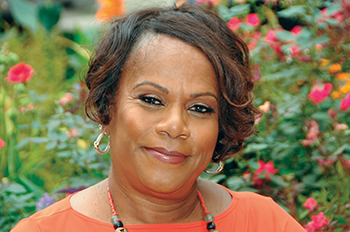
Social workers know that unjust and inconsistent societal rules create disparities, confusion and chaos, and a nation at war with itself. A crucial way to prevent such disasters is to guarantee all of our nation’s citizens have a voice through voting.
The right to vote is a constitutional privilege that is guaranteed to all citizens, and, as citizens, we must never allow anyone to create barriers and obstacles that do not allow every eligible person to freely and fully participate in our democracy.
On August 28, 2021 — a hot and humid day in the nation's capital — NASW and some of its members joined the March on for Voting Rights. NASW is a partner of the march, a nonviolent, nonpartisan mass mobilization to demand that elected officials protect democracy, denounce voter suppression, and ensure fair, easy access to the vote for all through the passage of comprehensive federal legislation.
Social workers took the necessary action, wore masks to help prevent the spread of COVID-19, and let the nation and our lawmakers know the profession will do whatever is necessary to protect the right to vote for all U.S. citizens.
NASW knew the conditions to march were risky. In fact, the threat of the coronavirus canceled companion marches in two cities. We know from history, however, that it was even more tumultuous for Civil Rights Movement leaders like Whitney M. Young Jr., a past president of NASW who helped organize and implement — and also spoke during — the 1963 March on Washington for Jobs and Freedom 58 years ago.
Young and fellow social worker Dorothy I. Height, president of the National Council of Negro Women, and other Civil Rights leaders risked their lives, enabling us to enjoy the right to vote. More than 40 people — including Dr. Martin Luther King Jr., James Earl Chaney, Andrew Goodman, Michael Henry Schwerner and Viola Liuzzo—were martyred during the movement.
These individuals not only risked their lives but also died for us. So, on August 28, we honored their legacy as we marched for the next generation of advocates who will continue the push to guarantee freedom for all. Being part of the Civil Rights Movement is a continuous fight for equity for everyone.
NASW staffers marched with me or helped coordinate our participation on social media. We were joined by Sandra Edmonds Crewe, dean of the Howard University School of Social Work; Darla Spence Coffey, president and CEO of the Council on Social Work Education; and Paige Jones, a former NASW intern who was recently selected for a Congressional Black Caucus fellowship in the office of Rep. Gregory Meeks, D-N.Y.
We carried the teal-colored NASW banner along the march route. Some people immediately identified with the profession, with one woman doing a happy dance and shouting how proud she was at that moment to be a social worker. Several social worker marchers took our photos, others recorded messages with us, and several others interviewed us on the spot about why we marched.

Pictured: Attending the Voting Rights March are, from left, Sandra E. Crewe, dean and professor of social work at Howard University; Mit Joyner, NASW president; Paige Jones, MSW, former NASW national intern; Melvin Wilson, recently retired NASW senior policy adviser; and Lee Westgate, NASW's manager of policy and advocacy.
As president of NASW, I was elated to be joined by current and future social work leaders. The age, breadth and depth of these social workers underscored for me that advocacy action from all levels of the profession is critical and essential.
Other social workers who marched or joined virtually also demonstrated that the social work profession must be outwardly committed to protecting the right to vote for everyone in order to protect our precious democracy. We march and demand that all citizens, no matter their party affiliation, have the right to vote and that their vote be fairly counted.
There is more difficult and often tedious work to do to achieve passage of the John Lewis Voting Rights Advancement Act and the For the People Act. If these two crucial pieces of legislation do not pass and become law, the future of this country as a democracy is in jeopardy.
We need all social workers to contact local, state and federal elected officials to let them know social workers support legislation that guarantees equitable access to the ballot box.
Social workers joined the march to protect the right to vote for all citizens, and now it is time to take further necessary action. As social work professionals, we must fully participate in the new civil rights movement.
Contact Mit Joyner at president@socialworkers.org